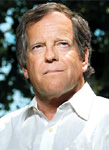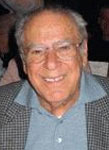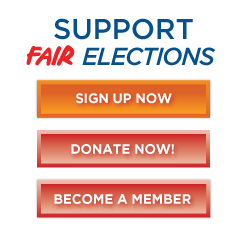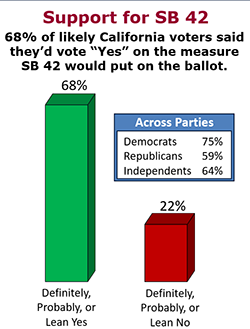The California Fair Elections Act Benefits Issues You Care About
Confidence in California’s elected officials is at an all-time low and too many Californians feel their voice just isn’t heard in Sacramento on the issues that matter to them and other regular Californians.
The California Fair Elections Act will start to change that by showing that candidates can run for office without having to rely on big, special-interest contributions. In the seven states that use Fair Elections systems:
- Elected officials are able to focus on the needs of the voters because they don’t have to spend so much time raising money for their next campaign.
- The political process has been opened up so that people with the best ideas can win even if they’re not rich or connected to wealthy special interest groups and lobbyists.
Fair Elections Help Issues You Care About
 |
- A Fair Elections system reduces the obstacles elected leaders face in adopting health care reforms that protect consumers and patients.
- Fair Elections systems in Arizona and Maine have enabled both states to adopt groundbreaking prescription drug pricing reforms that reduce costs for consumers.
|
“Nurses increasingly feel unable to fully take care of patients without curbing the influence of HMOs, drug companies, and other big campaign donors.”
— Malinda Markowitz, RN, California Nurses Association
|
Environment
 |
- When elected officials are free from special-interest influence they are more likely to vote protect the environment
- In the 2008 elections, environmental interests were outspent by 32-1 by oil companies, gas companies, and developers in California1.
- Legislators elected under Maine’s Fair Elections system were rated twice as high on a leading environmental scorecard2.
|
| “We need an election process that decreases the role of money in politics, and increases public participation and trust in politics.” — Carl Pope, Sierra Club Executive Director |
Economy
 |
- Consumers and taxpayers win when elected officials are freed from fundraising pressures.
- Financial industries gave $1.7 billion in campaign contributions over the last decade leading to deregulation that led to the financial collapse and their bailout at the cost of taxpayers.3.
|
| “The banks…are still the most powerful lobby on Capitol Hill. And they frankly own the place.” — Sen. Dick Durbin (Radio Chicagoland interview, May 28, 2009) |
 |
- The state budget for schools from kindergarden to college keeps getting cut.
- Kids and teachers win when schools aren’t pitted against wealthy special interests in the budget process.
- Maine made education a priority once they got Fair Elections and climbed to 4th in the country in adjusted per-puil expenditures.
|
| “There isn’t enough money for schools because money is wasted on giveaways to big donors. We need Fair Elections so we can invest in educating our children instead.” — Jennifer Saxon, Elementary School Teacher, Redondo Beach |
Women
 |
- Fair Elections open up our political process so more women can run for public office and win. An higher percentage of women candidates use fair elections financing in states with Fair Elections than their male counterparts.
- Women make up over 50% of California’s population, but in our state legislature, men outnumber them more than 3 to 1.
|
| “Any time I have a chance to speak to a group of women, I encourage them to run for office, and tell them it is possible using Clean Elections.” — Leah Landrum Taylor, Arizona Representative elected with Fair Elections |
Small Businesses
 |
- Fair Elections put small businesses on a level policy playing field with big multinational corporations.
- Fair Elections mean small businesses won’t have to face pressure to contribute in order to gain a seat at the table as policy is debated.
|
| “Businesses shouldn’t feel like that they have to make campaign contributions or suffer adverse consequences.” — Ted Williams, Former CEO Bell Industries and co-founder of the California Clean Money Campaign |
 |
- Big business outspends labor unions by up to a 26-1 margin — a Fair Elections system would level the playing field for worker interests.
- Fair Elections mean labor organizations can spend money on organizing and getting out the vote, rather than on candidate contributions.
- Fair elections provide an incentive for more candidates to reach out to organizations representing working families.
|
| “Working people win with Fair Elections financing, because voters and volunteers are the currency of
elections instead of big money. That's why the California Labor Fed strongly endorses Proposition 15..” — California Labor Federation Executive Secretary-Treasurer Art Pulaski |
 |
- Fair Elections allows more Latinos and other underrepresented candidates to run for and win elected office. The number Latino and Native American legislators in Arizona has increased by 67% since Fair Elections was instituted in 2000.
- Under Arizona and Maine’s Fair Elections systems, Latino voter turnout has increased as Latino communities increasingly feel their votes matter.
- Latino communities benefit when their elected officials don’t have to raise money in other, wealthier, communities.
|
| “Had it not been for Clean Elections, there's just no way I would have been...able to respond to all [my opponent’s] signs and mailers and fliers.” — Rebecca Rios, AZ Senator, elected with Fair Elections |
Civil Rights
 |
- Fair Elections open up our political process so more women, African Americans and other underrepresented groups can run for and win elected office.
- In Arizona, the small donors who participate to qualify Fair Elections candidates are much more ethnically and racially diverse than privately-funded candidates4
- Ethnic communities benefit when their elected officials don’t have to raise money in other, wealthier, communities.
|
| "Now is the time to make real the promise of democracy." — Reverend Dr. Martin Luther King, Jr. |
1 According to FollowTheMoney.org, Oil & Gas companies spent $25.5 million on California campaigns in 2008, Real Estate interests spent $15.4 million, and Construction interests spent $7.3 million. Pro-environmental policy groups spent only $1.5 million.
2 According to a analysis by the California Clean Money Campaign of the Maine League of Conservation’s environmental scorecards from 2003-2005.
3According to 231-page report,
"Sold Out: How Wall Street and Washington Betrayed America", issued by Essential Information and the Consumer Education Foundation.
4According to "
All Over the Map: Small Donors Bring Diversity to Arizona's Elections" by Public Campaign.












